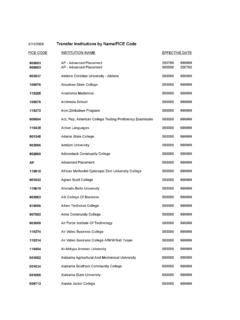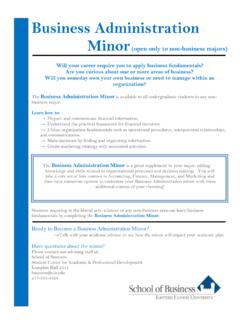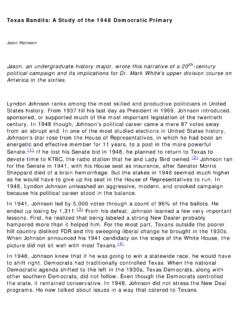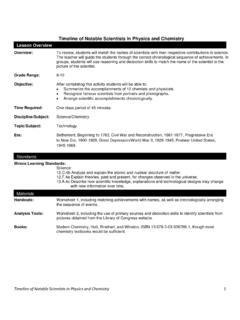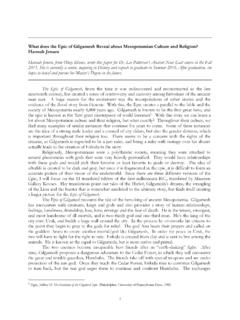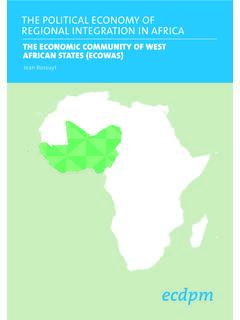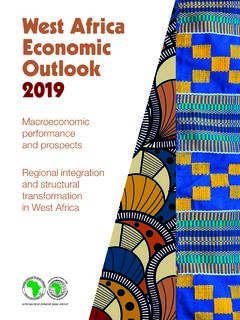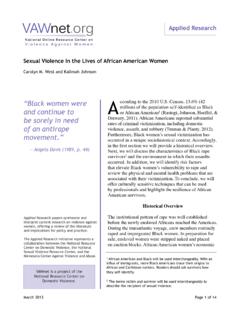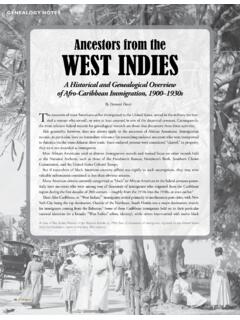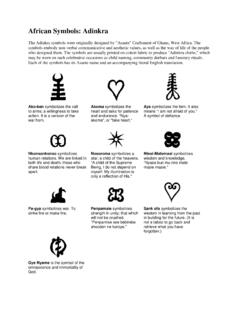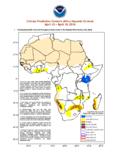Transcription of The Colonial and Post-Colonial Transformation of African ...
1 121 _____ The Colonial and post - Colonial Transformation of African Chieftaincy: A Historiography Moses A. Awinsong Mo ses Allor Awinsong is a history graduate student from Feo -Namoo in Ghana. He wrote this paper for Dr. Mark Hubbard's historiography seminar. _____ Introduction The arrival of Europeans in many African societies in the 1400s had an enormous impact on the institutions and practices of African people. Not all influences on African institutions lasted. Some institutions simply collapsed in the wake of dramatic change, while others metamorphosed into completely new and significant entities supporting the Colonial administration or the people. In the political life of Africa, one institution which stood the test of time was chieftaincy.
2 It grew under the weight of European influence as a collaborator with the imperial power and later as a victim, together with colonialism in general, of the anti- Colonial nationalism in the period after the world wars. The years of Colonial rule and the postcolonial system all proved influential in the evolution rat her than a revolution of chieftaincy across the continent. This paper offers an historiographical assessment of the Colonial and postcolonial Transformation of the institution of chieftaincy in Africa. A reading of the literature reveals two approaches, each conceptualizing the roles and place of chiefs in both the Colonial and postcolonial periods in Africa. The paper then will examine the different roles of chiefs during the Colonial and postcolonial systems.
3 While Marxist and imperialist scholars differ on chiefs role during Colonial rule, other scholars disagree about chiefs fortune in postcolonial Africa. The latter viewpoints are the adaptive and the marginalized schools. Overall, the paper studies the changes over time in the function of African chieftaincy under Colonial rule and in the postcolonial era of self-rule. The Chief before Nineteenth Century Political leadership in Africa was not a recent creation. Long before contact with European merchants, African societies developed sophisticated communities and kingdoms. Edward Bovill and Hallett Robin draw attention to the fact that many west African kingdoms had rulers with enormous wealth, organized judicial systems, and large armies before the fifteenth Some of these kingdoms were Ancient Ghana, Mali, Songhai, and Kanem-Bornu.
4 Organized judicial systems based on local and Islamic law shaped most of these societies. In Nigeria, the kingdoms of Oyo, Benin, Edo, and the Habe dynasties of the north molded the political destinies of the Some of these were neither Islamic nor Christian. They were completely the product of African people, resulting in centuries of political and organizational skills and experience. The kingdoms of Kongo, Zimbabwe, and other advanced societies of the southern parts of Africa were all well organized and 1 Edward William Bovill and Robin Hallett, The Golden Trade of the Moors: west African Kingdoms in the Fourteenth Century (Princeton, NJ: M. Weiner Publishers, 1995). Bovill and Hallett studied ancient states in west Africa.
5 Some of these kingdoms were Ancient Ghana, Mali, Songhai, and Kanem-Bornu. 2 Toyin Falola, and Matthew M. Heaton, A History of Nigeria (Cambridge, UK: Cambridge University Press, 2008). 122 efficient in the pre- Colonial era. In modern Ghana, the kingdom of Mamprusi, for instance, is traceable back to the It was the earliest of the Mole-Dagbani states in the savannah regions of Gh ana and Burkina Faso. Many of these states and kingdoms were instrumental in the trade, politics, and civilization of the Islamic world. By the time European merchants arrived on the coast of the Atlantic, many advanced civilizations had risen and fallen while many more were flourishing. They did not possess guns and gunpowder, but their social organization, economic interdependence, and involvement in the global economy through Mameluke Egypt and the North African merchants assured prosperity for aristocrats and freedom for the citizens.
6 With the coming of Portuguese and later other European merchants, the institutions and cultures that were created over centuries adjusted to meet the exigencies of the times. One such institution was chieftaincy, a key force for mobilization and stability in African communities. The position of chief was a ritual one in which they served as links between the living and the dead. Chiefs dispensed justice without favor in their role as the representatives of the ancestors. All these enriched the political fabric of the continent. This meant that Africa was not an empty, disorganized geographical place before the Portuguese encountered coastal Africans; however, as colonialists set about creating the new systems of political administration, the office of chief transformed in many ways.
7 Colonial Chieftaincy The formalization of European imperialistic control over African territories saw the first encroachment on the nature and authority of the institution. Mahmood Mamdani, writing from a Marxist-inclined position in Citizens and Subjects noted that Colonial rule brought with it European concepts of land In the process, the colonialists made land synonymous with chiefly authority by investing all lands into the native political institutions of the communities in rural Lands with no private claims were deemed royal lands, and later, government property, which was a deviation from African communal land ownership system. The colonialists therefore succeeded in transforming the ritual function of the chief into a political one.
8 This enhanced chiefly authority over land was an aberration from the custom and practices of the people. It became the foundation of native rule, according to historian Mahmood In a larger sense, Mamdani s argument shows that this change enabled Colonial powers to use chiefs as conduits to gaining concessions for the exploitation of resources for the good of the Colonial metropole. He reflects that chiefs were autonomous is not to say that they were independent. 7 Thus, land re-organization not only empowered chiefs, but Colonial powers as well. The reorganized political system based on new land tenure systems involving the Colonial administrators and the chiefs was therefore a symbiotic economic relationship in which colonialists and chiefs acted together for their own mutual economic benefit.
9 Kofi Abrefa Busia also contended in The Position of the Chief in Asante that the African system was originally a non-feudal Thou gh not a Marxist, he viewed the influence of chiefs in 3 Djibril Tamsir Niane et al eds., Africa from the Twelfth to the Sixteenth Century (Berkley, CA: University of California Press, 1997). 4 Mahmood Mamdani, Citizen and Subject: Contemporary Africa and the Legacy of Late Colonialism (Princeton, NJ: Princeton University Press, 1996). 5 The Aborigines Rights Protection Society of the Gold Coast protested the investiture of all unused lands in the hands of the British government in the late nineteenth century. For a detailed study, see, Kojo S. Amanor and Janine M.
10 Ubink, Contesting Land and Custom in Ghana. State, Chief and the Citizen (Leiden, Netherlands: Leiden University Press, 2008). 6 Mamdani, 141. 7 Ibid, 145. 8 Kofi Abrefa Busia, The Position of the Chief in the Modern Political System of Ashanti (London: International African Institute, 1951). 123 Colonial Africa through an economic lens. The right of usufruct, a practice undergirding African land tenure, was revoked in favor of a more Western system. Chiefs were made actual owners of land rathe r than the whole community. From them, the colonialists could easily obtain mining concessions, plantations, and other resources without much resistance. This was simpler for the Colonial authorities because there were only the chiefs to convince and not the whole tribe or community for access to resources.
